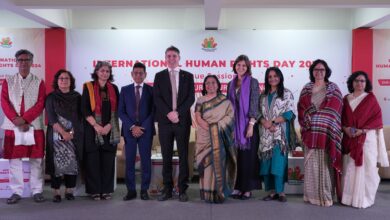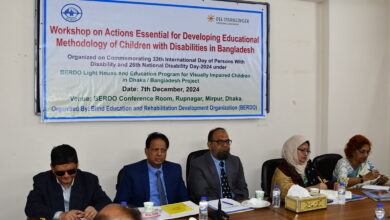
PARVEZ BABUL
The Midwifery Education Programme of BRAC University in Dhaka recently commemorated International Midwifery Day 2024 with a series of impactful activities aimed at highlighting the crucial role of midwives in healthcare. Under the theme: Midwives: a vital climate solution, the event emphasized the indispensable contribution of midwives to maternal health.
The celebration starts with a vibrant rally, symbolizing the unity and dedication of midwives towards improving healthcare outcomes. Following the rally, midwives engaged in community visits, providing essential health services such as health check-ups, blood pressure monitoring, family planning counseling, BMI assessments, health education sessions, and promoting hygiene practices like the practicing of hand washing.
Antenatal care check-ups were also conducted, ensuring the well-being of expecting mothers in the community. In addition, cultural flair to the event, participants gathered to celebrate with Midwifery song, traditional dances and songs reflecting the rich cultural heritage of Bangladesh. A lively debate stimulated intellectual discourse on pertinent issues surrounding midwifery and maternal health, fostering a platform for exchange of ideas and best practices.
As the spoke person, Dr. Sharmina Rhaman, head of the Midwifery Education Programme at BRAC University, expressed her enthusiasm for the event, stating: International Midwifery Day serves as a poignant reminder of the pivotal role midwives play in safeguarding the health of mothers and newborns.
Through empowering midwives with knowledge and skills, BRAC University is not only improving healthcare access but also nurturing advocates for climate resilience and sustainable development. The festivities culminated in a captivating cultural program featuring captivating performances including drama and song, captivating the audience and spreading awareness about the significance of midwifery in shaping healthier communities.
The Midwifery Education Programme at BRAC University remains committed to advancing the profession of midwifery, promoting excellence in education, research, and practice, and advocating for policies that prioritize maternal and newborn health, Dr. Sharmina added.
MIDWIFERY EDUCATION PROGRAMME, BRAC JPGHPH, BRAC UNIVERSITY
A publication of BRAC University mentioned that it introduced Midwifery Education Programme side by side with the Government in 2012. This innovative educational initiative, which is co-funded by the UK government and BRAC, is the first of its kind in the private sector in Bangladesh.
Bangladesh has made a commitment to end preventable child and maternal deaths by 2030. For reaching the goal the healthcare planners prioritized antenatal care (ANC), postnatal care (PNC), normal vaginal delivery (NVD), emergency obstetric care and newborn care, which directly links to quality maternal health services.
Given the plan and large number of maternity cases in Bangladesh, the country demands a huge supply of midwives to ensure healthy motherhood. An estimated 22,000 midwives will be required to meet the national need. To address this, the Government introduced midwifery into the health system. Moreover, United Nations; ‘Every Woman Every Child’ plan gives the Midwifery Programme a momentum.
To help attain the country target, BRAC University launched the ‘Midwifery Education Programme and introduced the course in 2012 as the first ever midwifery education initiative in Bangladesh’s private sector. Funded by the UK Government, this innovative education initiative develops around 230 midwives every year in partnership with six renowned NGOs of Bangladesh.
MIDWIVES: A VITAL CLIMATE SOLUTION
Climate change is the human-induced, undeniable greatest global health challenge and pressing issue of present time. The warming planet has more heat waves, more floods, and more anthropogenic and natural disasters that significantly impact the health of women and children. So generating resources and efforts into addressing the climate crisis is a matter of extreme urgency.
The International Confederation of Midwives (ICM) recognizes that midwives are a vital solution in adapting health systems to climate change, and lowering carbon emissions. Midwives deliver safe and environmentally sustainable health services and are first responders when climate disasters hit. For this reason, the theme for this year’s (2024) International Day of the Midwife (IDM), is Midwives: A Vital Climate Solution.
As a part of observing the day, at a discussion event organized by the BRAC University, the experts observed that as midwives, it is obvious that the midwifery model of care is environmentally friendly. Evidence shows that continuity of midwife care leads to optimal and safe outcomes by using fewer resources, resulting in less medical waste and a reduced ecological footprint.
The care the midwives provide also helps ensure that resources and the time and expertise of obstetricians are more available to women with complex care needs.
Globally, healthcare services emit around five percent of greenhouse gases. By offering continuity of care in communities, midwives reduce the need for avoidable travel to health facilities, thereby cutting the carbon footprint of healthcare while ensuring accessibility. Continuity of midwife care also empowers mothers to meet their breastfeeding goals, meaning mothers will often breastfeed longer duration.
Experts further said that breastfeeding requires no packaging or shipping, creates no waste and has a negligible water footprint. Helping mothers meet their breastfeeding goals is good for the short- and long-term health of babies and mothers, and it’s a remarkable win for the planet.
Beyond maternal and newborn care, midwives serve as champions of sexual and reproductive health. By providing education, contraception, and comprehensive abortion care, midwives provide women with the choice about if and when they want to start a planned parenthood/ family. Promoting women’s rights and economic resilience helps to reduce families’ vulnerability to the impacts of climate change.
Midwives are uniquely positioned to quickly reach and care for women, gender diverse people and babies affected by climate-related disasters. They are committed to serve as vital links for delivering prompt reproductive and maternal health services, and act as essential networks for disseminating evidence-based information and distributing supplies.
Discussants at the event pointed out that midwives are the climate-friendly, critical health workers to ensure that essential reproductive and maternal health services remain accessible and responsive to the needs for the communities.
Midwives are indeed a vital climate solution. As they celebrate the International Day of the Midwife, they call for investment, resources, autonomy, and a seat at every decision-making table, and favorable platform as well to include continuity of midwife care as a cornerstone of health system planning for climate resilience both nationally and globally.
The health and environment activists urged the print, electronic and social Media to advocate for action towards a healthier planet and healthier communities. So that together, they must create a more sustainable future, free from climate change and disasters. Those issues significantly relate with the Sustainable Development Goals (SDG) # 03 of the United Nations: Ensure healthy lives and promote well-being for all at all ages; SDG #05: Achieve gender equality and empower all women and girls; and SDG #13: Take urgent action to combat climate change and its impacts.





